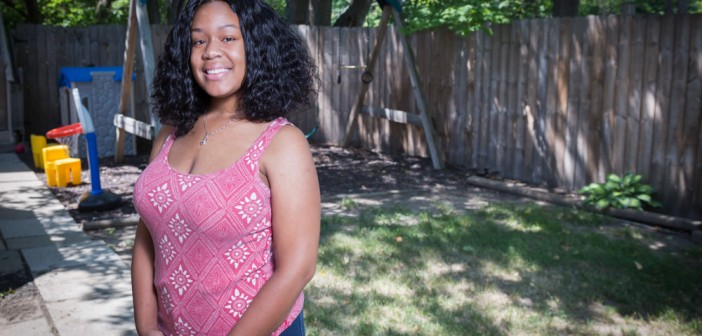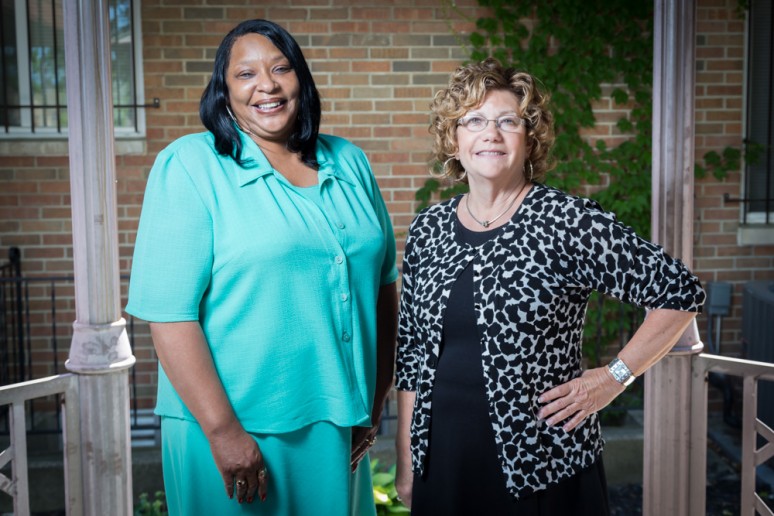For more than 30 years, Betty Rathfon, LMSW, ACSW, Director of Child Welfare and Home Based Services at Catholic Charities in Flint, has served the needs of children. “My passion is helping children and families,” says Rathfon, who grew up in a nurturing, loving family environment and believes her early learning in the area of family values stems from observing her parents, who were exemplary role models. “My nuclear and extended family members definitely valued children and their well-being,” she says. “Those beliefs and values carried into the profession I chose – social work.”
Rathfon’s career choice has shown her that not everyone grows up in a secure, equipped, and caring family. In fact, she sees young adults barely educated, teetering on the edge of being homeless, jobless, and without a family or support system. She commends Michigan lawmakers for addressing the needs of a forgotten age group, 18 to 21, through the Young Adult Voluntary Foster Care program – extended foster care for those who want to volunteer for it.
“I don’t have to fall into the category of how society
views foster care kids. I’m fighting for a better life.”
Briyanna Armour
Rathfon and her small team of caseworkers directly help those who “age out” of Michigan’s foster care system when they reach 18. “Society sees 18 as a magical number when everyone is suddenly viewed as an adult,” says Rathfon. “However, most of us, if we look back, were not ready to be on our own at that age. We had supportive families who helped us as we either went to college, moved out and maybe back in, let us leave our belongings in our rooms, helped us get a car, job, furniture, books, tuition and car insurance.”
Once a child in foster care turns 18, they are automatically out on their own. For example, Briyanna Armour, 19, who entered a foster home at the age of 16, would not be driving her 2006 Grand Prix or pursuing a nursing degree at UM-Flint if it wasn’t for the Young Adult Voluntary Foster Care program.
“I didn’t want to fall into the typical stereotype of a foster care kid who is on the street at 18,” says Armour, who has already mastered managing her own bank account and takes college classes in the winter, spring, summer and fall because she plans to graduate early. “I want to go to college and be a nurse. I don’t want to be dependent on the government. This is just a temporary time in my life. I love science and I want to help people. If I can help one person in the future the way I’ve been helped, then all of this will be worth it.”
Armour realizes that when they turn 18, most kids in foster care want to run as fast as they can away from that life. Michigan’s foster care statistics indicate that more than 900 kids aged out of foster care in 2015. Armour opted to stay and enroll in the Young Adult Voluntary Foster Care Program, which is known as extended foster care with special benefits and a safety net to help a young person become independent.
The program is voluntary and has many rules and regulations, but is worth it to Armour. “I am fortunate to be in this program that keeps me connected to people and provides me with a caseworker who genuinely cares about me and helps me with different outlets and resources I wouldn’t have known about.”
Rathfon isn’t alone in her passion to help the 18 to 21 age bracket.
Deborah Hayman, MAFS, MPA, is Armour’s caseworker – the one who genuinely cares about her – and she’s the agency’s adoption, licensing and foster care supervisor who came on board more than a decade ago.
Her arrival and desire to help young adults make decisions and find meaning in their lives strengthened after she suffered a personal tragedy. “My 17-year-old daughter died in her sleep from a grand mal seizure,” says Hayman, who finds satisfaction in helping kids who age out of foster care and are trying to transition into the adult world. “My daughter’s friends helped me during my time of grief and loss,” says Hayman. “I found their comfort and support valuable. They were at an age when they were heading off to college and making decisions about their lives – something my own daughter would have been doing. They asked for my advice. I tried to help and guide them in return for the way they helped me through my daughter’s death.”
She’s made a decade-long career out of helping young people who are known in the system as YVAC – Young Adult Voluntary Foster Care. “At age 18, a child’s foster care status ends,” explains Hayman. “Their case is closed. If they are not going to be able to return to their biological family, they can opt to live independently. That’s not easy at age 18, so they can volunteer to be in the YVAC program, if they’re eligible. They can receive financial help and support as they transition into adulthood.”
Both Hayman and Rathfon agree the program is certainly beneficial, but requires extensive documentation that can be daunting to most young people. The program can help a young person in many areas such as obtaining a vehicle up to a maximum of $5,000; getting $1,500 toward a security deposit for an apartment and first month’s rent; attaining $1,000 for furniture and start-up goods, and help getting a laptop computer, college classes, books and other items needed to live independently. There are strict requirements, too. “The young person must either be enrolled in college, working on educational goals, learning a skilled trade or be employed,” says Hayman.
Although there is a lot of red tape – forms to fill out, inspections, reports and documentation which must be completed and sent to the State of Michigan – Rathfon and Hayman know the end result is going to produce an independent, contributing member of society. “This program is giving them the opportunity for a better outcome later in life,” says Rathfon. “The State is just beginning to have a good focus on youth who are aging out of foster care. Helping this segment of the population is what we do: we exist to help provide social work and improve the lives of displaced young people.”
Armour admits she got discouraged with some of the delays, but persevered. “The government is my parent,” she says. “I wish things were more efficient. I understand there needs to be a process, but I just wish it was a smoother and quicker one.”
The mission of Catholic Charities and its programs is to provide help and create hope.
“That’s what we’re here for,” says Rathfon. “Our job is to help these young people who have no family members to assist them.” Having no family is Armour’s biggest challenge and leaves a scar. “I wish I had a real family,” says Armour, who praises her foster family, but realizes it isn’t the same. Hayman undoubtedly helps fill some of her maternal emptiness. “Miss Deb is awesome,” Armour smiles. “She’s definitely the best caseworker I’ve ever had. She’s cried with me, guided me, yelled at me.” She laughs. “But I recognize the passion she has for helping kids like me. I’m an only child on top of it. I wish I had what other young people have – a mother and a father, brothers, sisters – and I miss the family things. But I’m going to rise above this. I know I don’t have to be what, or end up where, I came from. I don’t have to fall into the category of how society views foster care kids. I’m fighting for a better life.”
To become a foster parent or learn more about the Young Adult Voluntary Foster Care program, call 810.232.3418.
Photography by Eric Dutro









